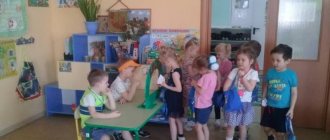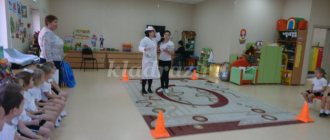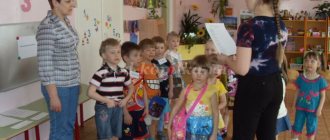DIY attributes for role-playing games. Master class with photos
Gorshkova Nadezhda
DIY attributes for role-playing games. Master class with photos
Master class “Creating a subject-development environment for role-playing games” part 2
Play is the main activity of a preschool child, one of the characteristic patterns of child development, a way of understanding the environment. A child spends most of his time playing; any game is a joy for him, but when a game with beautiful colorful attributes is doubly interesting. Therefore, I try to come up with various attributes for games.
Games about school
Games about school motivate a child to learn, help develop an interest in obtaining new information, the ability to find it, and thereby help to become successful not only during school, but throughout life.
The content of games about school can include both subject and social aspects, because school is not only about learning, it is also about life in the school community.
The games were invented by methodologist Natalya PRISHCHEPENOK.
“We live happily together”
The presenter invites the game participants to take turns naming the qualities that first-graders need. The presenter helps the children with leading questions so that they name not only the qualities related to the educational, but also the communication skills of schoolchildren.
“What and how?”
The presenter asks the children questions regarding various aspects of school life. Children answer what, in their opinion, should be done in this or that case, and how to proceed. The game helps children form moral principles of behavior.
Examples of questions:
- What to do if you haven't learned your lesson?
— What should you do if a classmate is bullied in your presence?
— What to do if the student who answers at the board does not know the answer?
— What should you do if your neighbor at your desk asks you to copy the correct answer?
— What to do if you are late for class?
Outdoor game “People around”
As diagnostics using the participant observation method shows, most modern first-graders do not know how to... move. The child does not understand that besides him there are other people around who also have the right to space around him. It is necessary, with the help of games, to prepare preschoolers for life in a team, helping them learn to see and feel the people around them.
This game is aimed at developing spatial thinking, coordination, the ability to see people around you and position yourself in space without disturbing others.
The game simulates situations when you need to move to make room for other people. Examples of situations: a bus during rush hour (it is necessary for children to understand that they cannot stand in the doorway, preventing others from getting on and off if your stop is not the next one), leaving a theater during intermission or after a performance, entering the subway and escalators, and etc.
"Fairytale Schoolchildren"
The task of the game participants is to come up with which of the fairy tale heroes can become schoolchildren, and how they will behave in class. The leader helps the children and with guiding questions helps them determine how real students should actually behave.
In this game you can use puppet theater dolls, pictures or toys depicting fairy-tale characters. A continuation of this game can be a role-playing game or a puppet show “Fairytale School”.
“Why do we need school?”
The game helps to develop motivation to study at school. You can play in teams or individually. The participants’ task is to come up with as many reasons as possible for going to school. The participant who names as many positive reasons for studying at school as possible wins.
“Still, school is great!”
The game develops positive thinking. Two teams play. The presenter names some negative, in the children’s opinion, event related to school, for example, “You have to get up very early to be on time for school.” Teams take turns to name as many positive events as possible that this negative thing can lead to. For example: if you get up early, you will have time to do a lot, and so on. Thus, a negative event turns into a positive one.
In one game, you can discuss 3-4 such negative statements, turning them into positive ones.
"I'am a teacher"
The presenter invites the children to imagine themselves as school teachers and come up with what they would teach their students. You can think of what kind of lessons there could be at school and what they would study. And then you can play such a fun school with “students” - dolls and soft toys.
"School of my dream"
The presenter invites the children to draw or describe in words the school of their dreams. And then you can organize an exhibition of drawings and essays and invite real teachers from a real school to see what the children at school are missing.
“What is good at school and what is bad at school?”
The game helps to develop a positive perception of reality and forms a positive attitude towards learning at school.
Two teams play. One team names 10 school things and circumstances that can be described as “good,” and the second team names 10 school things and circumstances that, in their opinion, can be described as “bad.” The teams speak in turns. After everything has been said and the teacher has written everything down, everyone tries to figure out together whether they are presenting everything correctly.
ON A NOTE. Finger and puppet theater at low prices in the specialized store “Kindergarten” - detsad-shop.ru.


